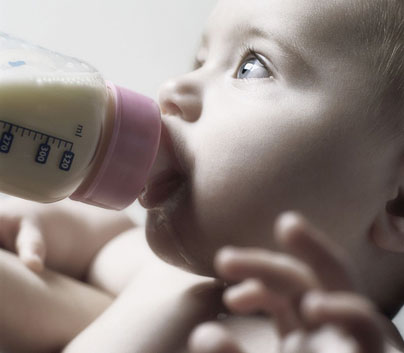A controversial chemical, Bisphenol-A (BPA), will not be removed from baby bottles in the UK, despite moves by manufacturers to stop using it in the US.

Baby bottles: controversial chemical removed from bottles in US – but not in Britain Photo: GETTY
The ban in the United States has come amid fears about the possible side effects of Bisphenol A, it emerged on Saturday.
Six American manufacturers say they are reacting to consumer demand by removing BPA from their bottles.
But they will continue selling bottles containing BPA in the UK, a decision which has prompted anger among campaigners.
Belinda Phipps, chief executive of the National Childbirth Trust, said: “It’s time the companies in the UK followed suit with what the companies in America and Canada are doing.
“We shouldn’t have bottles on the market that leach BPA. Parents would like to choose not have BPA in their babies’ feeds and they don’t find that choice easy right now.”
The Food Standards Agency insists BPA in UK plastic products is “well below the levels considered harmful”.
The chemical is widely used in plastic manufacture and is commonly found in food and drink containers and there has been growing concern about the possible effects of it leaching into babies’ feed when bottles are heated.
The advice for parents is not to pour boiling liquid directly into bottles, not to microwave them or use scratched or worn ones.
Research carried out at Exeter University has found that adults with high levels of BPA in their system were more prone to heart disease and diabetes
Dr Iain Lang, who led the study, said: “There is not enough to provide us with the evidence to say there is definitely a link, there is definitely something going on.
“But in addition to some of the previous work that has been done looking at younger children and looking at animals this does increase the likelihood that there are problems associated with BPA.
“Parents would like to choose not have BPA in their babies’ feeds and they don’t find that choice easy right now.”
Major UK retailers of baby bottles do stock BPA-free alternatives and one leading manufacturer, NUK, has bowed to pressure and removed BPA from all of its products.
However, the chemical industry insists BPA is one of the most extensively-tested chemicals and that new EU legislation will ensure its safety.
Steve Elliot, chief executive of the Chemical Industries Association, said: “There’s been lots of work done, whether it’s been by the Food and Drug Administration in the States, whether it’s by the Food Standards Authority at a European level or the FSA in the UK.
“Lots of data, lots of research, lots of sampling and none of those tests suggest that there is a risk to human health.”
In 2008, Canada formally declared BPA a hazardous substance and announced plans to ban the import or sale of bottles containing it.
The announcement by six manufacturers in the US is being seen as attempt to pre-empt moves by the US congress to introduce legislation banning Bisphenol-A, which is suspected of harming human development, from all food and beverage containers.
Democratic Congressman Edward Markey, one of the authors of a bill to ban BPA in the US, said: “The scientific evidence is mounting that BPA poses serious health risks, especially to children, and manufacturers and retailers have already started to pull items from their store shelves.
“It is time for Congress to act quickly to ban this toxin from all food and beverage containers so that parents can feed their children without worrying that the food contains poisonous chemicals.”
By Patrick Sawer
Last Updated: 4:26PM GMT 14 Mar 2009
Source: The Telegraph